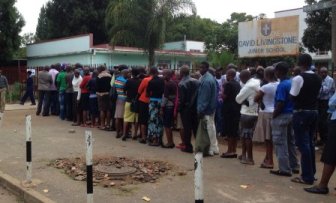 Zimbabweans headed to the polls Wednesday in a hotly contested election as President Robert Mugabe seeks to extend power to a potential 38 years.
Zimbabweans headed to the polls Wednesday in a hotly contested election as President Robert Mugabe seeks to extend power to a potential 38 years.
Mugabe, 89, has been at the helm since 1980, the only leader the nation has known since it gained independence from Britain.
Of the total five presidential candidates in the general elections, his main rival is Morgan Tsvangirai, the current prime minister.
The polls will end an uneasy coalition government formed after violence broke out when Mugabe claimed victory over Tsvangirai in the last election five years ago. The post-election violence left 200 people dead and thousands more injured, rights groups said.
'Evidence of manipulation'
Regional leaders dismissed that election as a sham and pressured Mugabe to form a power-sharing agreement with Tsvangirai and his opposition Movement for Democratic Change. As a result, the two bitter rivals entered into a tense coalition in 2009.
Opposition candidates have declared they have no confidence in this election, either.
"There is clear evidence of manipulation" in poll preparations, Tsvangirai, 61, said days before the election. He said ballot papers cast in his favor during early voting were discovered tossed in a bin.
Rights groups have accused the government of intimidating and beating up opposition supporters, and interfering with the polls. Mugabe's party has denied the accusations.
Mugabe to West: Back off
The elections will be held under a new constitution endorsed in a March referendum that limits the president to two five-year terms. Mugabe is allowed to seek another term because the rule does not apply retroactively.
Last week, he had a few words for critics of the upcoming election, especially the West.
"Keep your pink nose out of our affairs, please," he said in response to criticisms from the United States on his push for elections without key reforms.
About 6.4 million voters in Zimbabwe -- half of the country's population -- are eligible to cast their ballots, according to the electoral commission.
Mugabe has vowed to step down if he loses. The electoral commission has five days from the close of polling to release results.
"You either win or lose," he said. "If you lose, then you must surrender to those who have won. If you win, those who have lost then must surrender to those who have won. This is it. We will do so. Yes. Comply with the rules."
And he had a conciliatory message for Tsvangirai.
"I've got my fair share of criticisms and also dealt back rights and lefts and uppercuts. But that's the game. Although we boxed each other with Tsvangirai, it's not as hostile as before. It's all over now. We can now shake hands," he said.
'A historic day for all'
Mugabe and his main opponent voted at different polling stations in Harare.
"Today is a historic day for all to complete the delayed runoff of 2008," Tsvangirai said. "It's an emotional moment when you see all these people coming to vote."
The prime minister has always maintained that the 2008 election was rigged. At the time, the electoral commission said Tsvangirai and his Movement for Democratic Change had won, but not by enough to avoid a runoff. He later withdrew from the runoff, saying government loyalists had killed hundreds of his supporters.
Citizens say this is a crucial election in more ways than one. And despite the setbacks, it provides another shot at democracy.
"We are still a young country ... our democracy is still young," said Nigel Mugamu, who lives in the Zimbabwean capital of Harare. "A lot of African countries have changed leadership at least once or twice. We haven't seen a new face. From that perspective, it's an exciting time. Will this be the moment it will happen?"
Hope after hyperinflation
Mugamu said a peaceful election will help boost investment. This is the first poll since Zimbabwe battled hyperinflation that left investors jittery and led many to abandon the country's currency.
In 2009, the nation introduced a 100 trillion-dollar bill that was worth about $300 in U.S. currency. At the time, a loaf of bread cost about 300 billion Zimbabwean dollars.
The hyperinflation forced traders to insist on international currency to hedge against losses. They preferred the U.S. dollar or South African rand, and most workers demanded their salaries in foreign currency.
Despite widespread poverty, the nation has made major strides since then, experts say.
"Zimbabwe has made considerable progress in stabilizing the economy since the end of hyperinflation in 2009," the International Monetary Fund said last month.
Since then, the nation's gross domestic product "has grown by an average of over 7 percent and inflation has remained in the low single digits. Government revenues have more than doubled from 16 percent of GDP in 2009 to an estimated 36 percent of GDP in 2012, allowing the restoration of basic public services."
And as the nation returns from the brink of a crippled economy, Zimbabweans remain hopeful.
Linda Mukusha braved long lines and chilly morning weather to cast her vote in Harare.
"I hope Zimbabweans turn out to vote in huge numbers," she said. "Whoever wins, the country needs to move forward."
She proudly displayed an inked finger after casting her vote.
Journalist Columbus Mavhunga contributed to this report from Harare, andCNN's Faith Karimi wrote and reported from London. CNN's Sarah Brown contributed to this report.
Portland and Seattle
Free Subscription to Breaking News
Free Subscription to Breaking News























































































































































































































































































































































